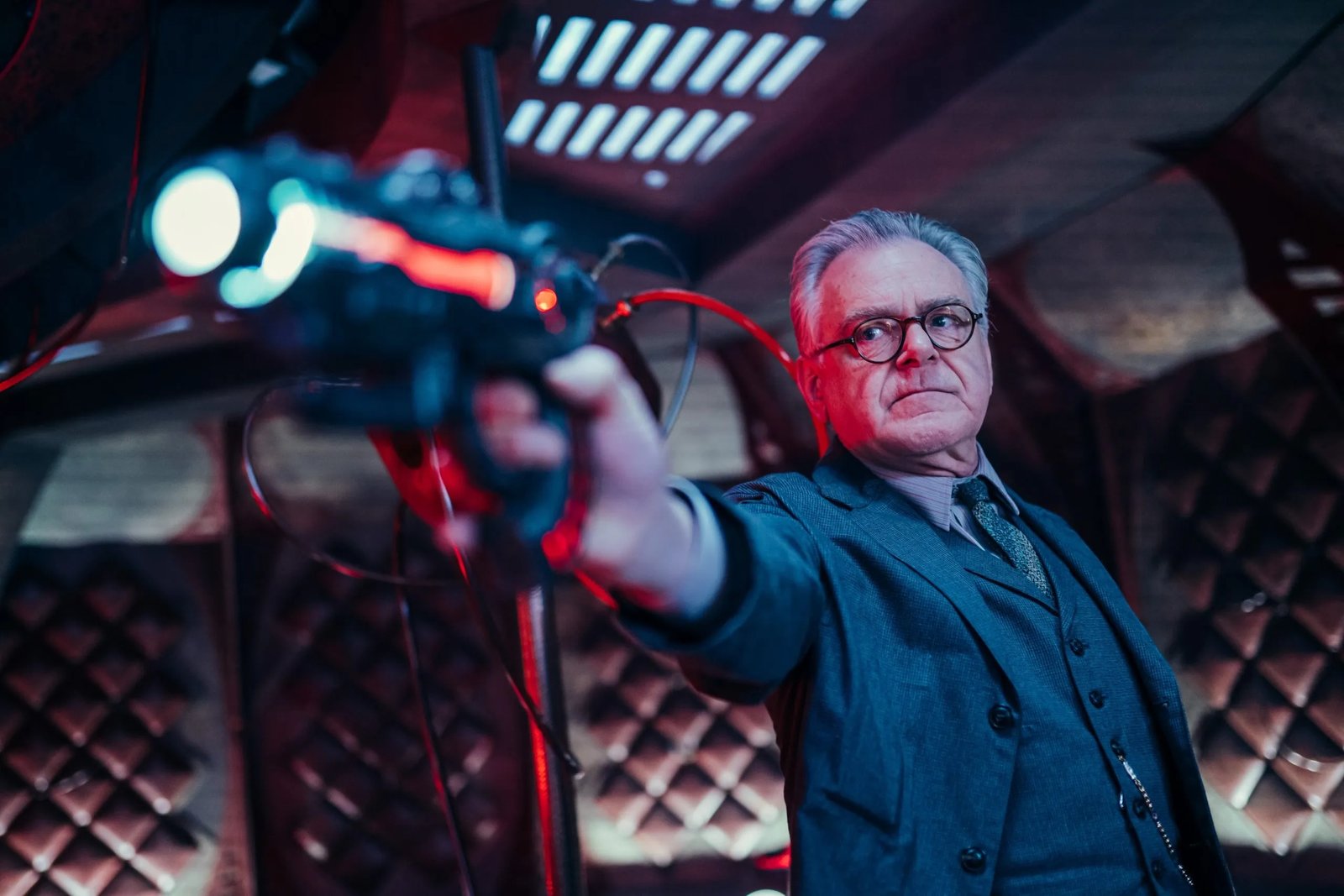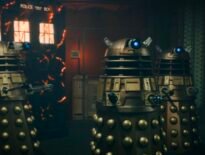My family and I are big fans of The Goes Wrong Show. A TV spin-off from long-running West End hit The Play That Goes Wrong, each week sees the Cornley Polytechnic Drama Society tackle a new work, ‘live’ on the Beeb, only to be hindered by mis-sized sets, exploding props, and actors who don’t seem to understand the concept of stage directions. It’s rip-roaring family entertainment, ridiculous and physics-defying, and occasionally very touching, but it’s the opening episode of series 2 I wanted to discuss: tired of the group’s continual failings, the bombastic Robert (Matt Berry meets Brian Blessed) stages a successful coup and then directs a period drama called ‘Summer Once Again’, insisting on perfection throughout. When the opening scene inevitably falls apart, Robert stops the action and asks for a reset: this happens over and over and by the time we actually finish it, most of the show’s running time has already elapsed and the actors have no choice but to frantically hurry through the rest of the play. Scenery flies in and out in an instant, dialogue is rushed or omitted entirely, and seasons change in a flurry of falling leaves and fake snow until the curtain falls on the breathless and deeply unhappy troupe.
The last time we saw the Doctor, things didn’t look good — but sometimes, particularly when your back’s against the wall, you have to cut a corner or two. The Vanquishers has a lot of loose ends to tie up, and it manages by cheating, as well as a certain amount of economisation. After an abrupt and somewhat disappointing conclusion to last week’s cliffhanger (the Doctor evades certain death at the hands of Swarm by diving out of the way), we’re back at invasion central: Yaz and Dan and Jericho are cornered by marauding Sontarans, Kate Stewart’s left UNIT in the hands of the Grand Serpent, and the Doomsday Clock has ticked another second closer to the heat death of the universe. So much to resolve, and so little time.
The only solution to such a conundrum, of course, would be if the Doctor could be in three places at once. And this week, for the express purposes of plot, that’s exactly where she is: split assunder between three different locales, phasing in and out as per the story’s needs, usually at the most inconvenient of moments. It plays rather like the Star Trek: TNG finale, All Good Things…, in which Picard has to navigate both his past and (imagined) future in order to deal with a spatial anomaly and get Q off his back. So while Doctor The First is gallivanting round a Sontaran base with Karvanista and Bel, Doctor The Second is reunited with Yaz and Dan, where they deal with the threat of alien invasion and the imminent destruction of the universe by bribing a Sontaran with chocolate. It’s quite as ridiculous as it sounds: there is no reason for its presence other than the fact that it’s funny (to varying degrees; Moffat really handled this stuff rather better) and the sight of a wide-eyed Dan Starkey goggling over a bar of Dairy Milk is destined to be memed to death, which was presumably exactly what Chibnall wanted. There are probably worse ways to be mark your place in Doctor Who’s history. If you’re going down, at least go down fighting.

Meanwhile, Doctor The Third is stuck at Division Centre, with a disinterested Ood and a couple of psychopathic killers for company. At least, we assume they’re psychopathic. To be honest, my entire assessment of Swarm and Azure is built on assumptions. They’re merciless guardians of entropy from a period we glimpsed only in flashback and only when there were dozens of other stories going on at the same time. Chibnall gives us enough to join the dots — just — but at the risk of mixing metaphors, the picture that results isn’t so much a bucket and spade as it is a Rorschach inkblot, or the fuzzy scribble that hounded Rose in Fear Her. Oh, there’s an enjoyable conversation between Azure and the Doctor — Whittaker at her most intense, sparring with a smirking villainess who thinks that all life is futile and deserves to be snuffed out (as I recall, Judge Death aspired to a similar philosophy, though he had more impressive teeth). But this is a meagre banquet, a scrap of development here and there, a sliver of empathy amidst the gloating. Both Azure and her brother retire from this mortal coil (disintegrated by the demigod they have supposedly resurrected) no further fleshed out than the bronzed skeletal bodies they’ve inhabited since episode one: all sneer, no substance. We don’t really know what they’re up to, or why, and we don’t particularly care either.
At least it looks pretty. You might accuse Doctor Who of being top heavy when it comes to CGI, but it seems churlish to complain when we’re being granted the spectacular vistas we’d arguably been denied during the scaled down stories we witnessed in Series 11 and 12. Dalek fleets explode in dazzling panorama. Sontaran fleets loom over Rio de Janeiro and Paris (we know it’s Paris, of course, because you can see the bloody Eiffel Tower). And the Doctor wanders through a black and white flashback of her own childhood, as the mysterious floating house drifts in and out of existence with a wave of Swarm’s gloved hand — he and Azure providing the only pigmentation in an otherwise drab monochrome, like the girl in Schindler’s List, or the video for ‘Wonderwall’. Ironic, seeing as they themselves are so utterly bereft of colour.
The discussion we had last week — concerning past lives and forgotten history — becomes a McGuffin of sorts for the Doctor, or perhaps an obstacle. There simply isn’t time to actually delve that far, not when there are so many other plot strands to resolve. Tecteun is given only the most cursory of mentions; this has now become about stopping the Flux. Learning about the past, we are assured, is a distraction, and when the whole thing is dangled quite literally in front of the Doctor’s nose in the shape of a fob watch she wisely elects to hide it in the dimensionless depths of the TARDIS, safe from herself and future showrunners, “unless I really ask for it”. The implication, surely, is that we’re moving on, at the very least until New Year’s Day, although I suspect that fans will not let it rest that easy.

But while Swarm destroys and rebuilds the floating house, you can’t help but feel mildly disappointed that the Doctor never enters it. Oh, there’s nothing wrong with a bit of mystery; nor are we necessarily done with this story arc, the question of what’s behind that rotting wooden door merely postponed, rather than shoved back into Pandora’s box right before it’s thrown into the sun. There’s no reason we couldn’t go back — all the same, having come this far, why couldn’t we have ventured a little farther? Seen the experiments in the cabinets; cast our eyes over a series of bizarre objects; glimpsed a dozen unknown figures who may or may not have been prior incarnations, like the screen in Morbius’s lab? (Question: is it Division? Or The Division? Because the definite article seems to have gone walkabout this year, and it’s not down the back of the sofa, because I’ve looked.)
Whittaker herself is affable and watchable, whether she’s giggling on a torture rack or flirting with herself (often in the same scene). Time and again she’s shown herself to be an expert at the frivolous remark — “What this ship really needs,” she mutters, faced with someone else she doesn’t know, “is lanyards” — but while she possesses Tennant’s facetious light-heartedness, we don’t really delve much beyond that, save a couple of brooding remarks and (god save us) an actual tear during a final not-quite conversation with Yaz. There is none of the fire that lit her during The Haunting of Villa Diodati — it’s mostly down to the script, but you wish she’d reacted to the genocide of the Lupari with a little more emotion. Even a dual appearance as the personification of Time, dour-mouthed and serious and sporting a different coat, is largely wasted.
The companions have their own journeys this week: Dan’s takes him to the TARDIS (by way of the museum we saw him exploring in The Halloween Apocalypse); Vinder and Bel wander straight into each other’s arms, electing to wander the cosmos with Karvanista. It’s all a bit Guardians of the Galaxy, without the tree — although Bel still hasn’t had that baby, and it’s been in there for years, so who knows what she’s actually growing? As for Karvanista, the bushy sidekick is given the nearest thing we get to character development, angrily declaring his backstory with the Doctor off limits (reliving the memory, it turns out, will literally kill him) but giving us hints that the pair were closer than we’d realised. “There was a time I’d do anything for you,” he glowers from the neon haze of a Sontaran prison cell. “But you left me.”
It is Jericho who is granted a hero’s death, bowing out in a literal blaze of glory after proving rather too trigger-happy defending Claire from an oncoming Sontaran patrol. It was inevitable: Kevin McNally does a good line in indignant pomp, and you find yourself nodding and smiling as he introduces himself as ‘Scourge of Scoundrels’, before noting — just before he’s incinerated by the blast — that it would have been a brilliant title for his autobiography. My children were upset, but that’s all part of the fun. It’s not proper Doctor Who unless you lose a supporting character you actually like. (No, Adric doesn’t count.)

And yet it feels rushed. This, you sense, is what happens when you film an ambitious storyline in the height of a pandemic. There is enough material here to fill a series of 10 episodes, possibly more if they stretched out the camerawork. Instead, we’re plagued with enough jump cuts to make the cafe scene in Bohemian Rhapsody look like a Ken Loach film. I’m not asking for pages of dialogue; I’m just asking for the chance to pause for breath. Because when McNally died on that ship, you really feel he ought to have had a little more time. When Bel and Vinder collapsed into that embrace, they needed another minute or two — enough time, at least, for Vinder to process the fact that he was going to be a father. And if the not-quite relationship between Dan and Diane deserved a little more closure than a bit of mumbling about restaurant bookings; or if nothing else a little more than a single wistful stare. Flux manages, at the very least, to give a decent send-off to the Grand Serpent, who is fittingly exiled (by Vinder and Kate) to an isolated rock in deep space, where he can have the rule of authority he always craved, in complete solitude. Be careful what you wish for.
There is a sense of frustration about it, because Flux feels like the series Chibnall always wanted to make: grandiose, world-changing, and with a sense of finality, a set of water cooler moments to rival Tennant diving through the hatch of an open spacecraft, Eccleston’s defiant “I’m coming to get you,”, or Capaldi’s four billion year wall punch. Certainly there have been scenes and segments that we’ll be talking about for some time: the Angel freeze-up at the end of part four, the heist on Atropos, the literal destruction of the entire cosmos at the end of the first installment. Even the Sontaran in the corner shop, although not every word said about it will be praiseworthy.
But it’s hard not to feel a little cheated, just as the programme itself cheats in order to (more or less) finish its narrative on time. There is nothing untoward about the bending of physics or the narrative trick used to get the Doctor back into the universe in order to save it, except that it feels rushed, hastily implemented, skirted around in order to Get The Story Done. And it is for this reason that The Vanquishers epitomises, on many levels, everything that’s been both good and bad about this year. It’s fun and bold and often exciting; these are all good things, and to be treasured, because we don’t have enough good things these days. But it’s like wolfing a McDonalds on your way back to the train station — you feel like you’ve experienced something hot and mildly satisfying, but you can’t really tell what it was. There is a sense of things being unfinished, of time being wasted, of opportunity squandered. For all its good qualities, it is hard not to view Flux as a breakneck scramble for the finish line, an ensemble of confused players rushing through the final act before the credits roll, yanked up at speed with the same indecipherable intensity as the drama that preceded them.




